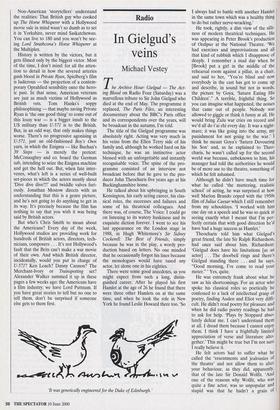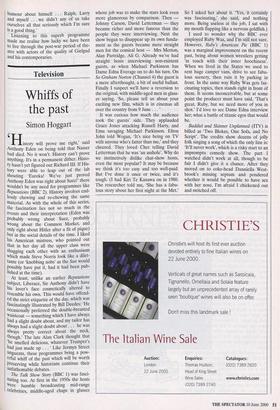Radio
In Gielgud's veins
Michael Vestey
The Archive Hour: Gielgud — The Act- ing Blood on Radio Four (Saturday) was a marvellous tribute to Sir John Gielgud who died at the end of May. The programme it replaced, The Paris Files, an interesting documentary about the BBC's Paris office and its correspondents over the years, will be broadcast in the autumn, I'm told.
The title of the Gielgud programme was absolutely right. Acting was very much in his veins from the Ellen Terry side of his family and, although he worked hard on his technique, he was an instinctive actor blessed with an unforgettable and instantly recognisable voice. The spine of the pro- gramme consisted of an interview not broadcast before that he gave to the pro- ducer John Theocharis five years ago at his Buckinghamshire home.
He talked about his upbringing in South Kensington, his early acting career, his clas- sical roles, the successes and failures and some of his theatrical colleagues. And there was, of course, The Voice: I could go on listening to its watery huskiness and its exquisite diction forever. I went to see his last appearance on the London stage in 1988, in Hugh Whitemore's Sir Sidney Cockerell: The Best of Friends, simply because he was in the play, a wordy pro- duction based on letters. No one minded that he occasionally forgot his lines because the monologues would have taxed any actor, let alone one in his eighties.
There were some good anecdotes, as you might expect from such a long, distin- guished career. After he played his first Hamlet at the age of 26 he found that there were three other Hamlets on at the same time, and when he took the role in New York he found Leslie Howard there too. 'So I always had to battle with another Hamlet in the same town which was a healthy thing to do but rather nerve-wracking.'
He took, rightly, a dim view of the silli- ness of modern theatrical techniques. He was appearing in Peter Brook's production of Oedipus at the National Theatre. 'We had exercises and improvisations and all that kind of rubbish which I disapprove of deeply. I remember a mad day when he [Brook] put a girl in the middle of the rehearsal room against a pillar, in a chair, and said to her, "You're blind and now everybody in the cast has got to come up and describe, in sound but not in words, the picture by Goya, 'Saturn Eating His Children'." A terrible, frightful thing. So you can imagine what happened, the noises that came out of people. Nobody was allowed to giggle or think it funny at all. He would bring Zulu war cries on record and we'd all do t'ai chi every day. It was a night- mare; it was like going into the army, my punishment for not going to the war.' I think he meant Goya's 'Saturn Devouring his Son' and, as he explained to Theo- charis, he wasn't called up for the second world war because, unbeknown to him, his manager had told the authorities he would be of more use to the theatre, something of which he felt ashamed.
Although he didn't have much time for what he called 'the muttering, realistic school' of acting, he was surprised at how well Marlon Brando coped with the 1950s film of Julius Caesar which I still remember from my schooldays. 'I worked with him one day on a speech and he was so quick at seeing exactly what I meant that I'm per- fectly certain that with good direction he'd have had a huge success as Hamlet.'
Theocharis told him what Gielgud's great friend, the late Sir Ralph Richardson, had once said about him. Richardson: `Gielgud does have his limitations [as an actor] . . . The doorbell rings and there's Gielgud standing there . . . and he says, "Good morning, I've come to read your meter." ' Yes, quite.
He was extremely frank about what he saw as his shortcomings. For an actor who spoke his classical roles so poetically he confessed to a lack of intellectual grasp of poetry, finding Auden and Eliot very diffi- cult. He didn't read poetry for pleasure and when he did radio poetry readings he had to ask for help. 'Plays by Stoppard abso- lutely defeat me. I can't understand theni at all. I dread them because I cannot enjoy them. I think I have a frightfully limited appreciation of verse and literature alto- gether.' This might be true but I'm not sure I really believe it.
He felt actors had to suffer what he called the 'resentments and jealousies of the theatre' and not allow them to alter your behaviour, as they did, apparently, that of the late Sir Donald Wolfit. 'And one of the reasons why Wolfit, who was quite a fine actor, was so unpopular and stupid was that he hadn't a grain of humour about himself . . . Ralph, Larry and myself . . . we didn't any of us take ourselves all that seriously which I'm sure is a good thing.' Listening to this superb programme made me realise how lucky we have been to live through the post-war period of the- atre with actors of the quality of Gielgud and his contemporaries.

































































 Previous page
Previous page